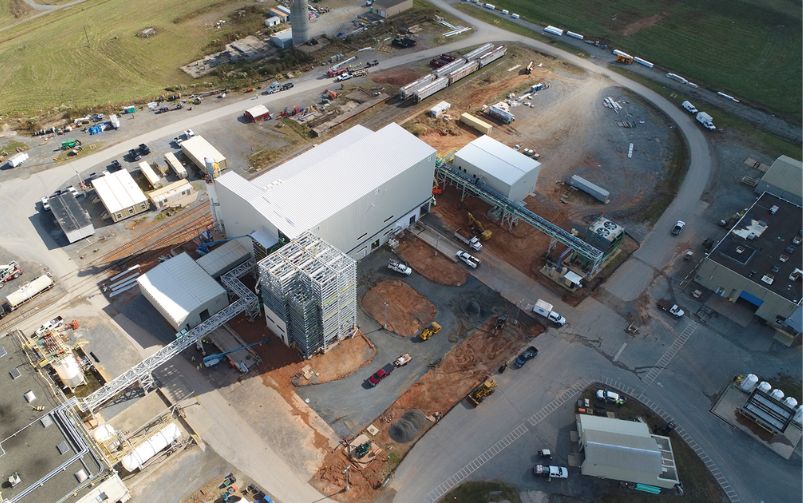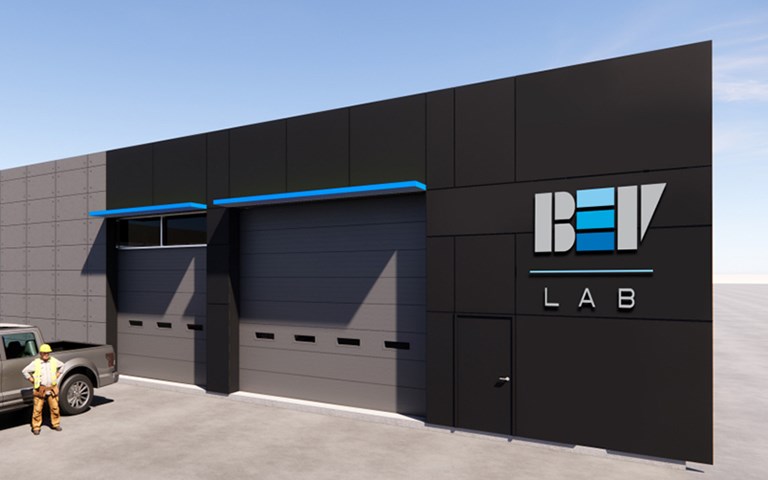A rendering of Cambrian College’s BEV lab, which is anticipated to open its doors to students in October. Courtesy of the Centre for Smart Mining.
Cambrian College’s Centre for Smart Mining, a specialized research hub in Sudbury, Ontario, is set to finish construction on its new battery electric vehicle (BEV) lab in August.
The 5,600-square-foot lab will feature equipment for BEV prototyping and testing powertrains and batteries, including battery emulation equipment, duty cycle testing equipment and dynamometers.
The BEV lab is expected to open its doors in October to students studying mechanical engineering, mechatronics, electrical engineering, heavy-duty equipment mechanics and automotive mechanics. In 2022-23, about 85 students were enrolled in the Centre for Smart Mining and an estimated 30 students will be receiving training in the BEV lab yearly.
According to Steve Gravel, manager of the Centre for Smart Mining, students will be able to get hands-on experience and lead research and development projects on BEVs and electric powertrains and batteries, filling an urgently needed talent pipeline in the industry. Gravel said it is the only public research facility in Canada to focus on mining and heavy-duty electric equipment.
Gravel said companies will be able to test new BEVs they are interested in buying and that a few mining companies have already shown interest, including Glencore.
“[Mining companies] want to understand how often [equipment] is going to need to be charged, at what point in the shift, and if they can expect the battery to run out depending on the duty cycle that it’s designed for,” Gravel said.
The projects undertaken at the BEV lab will be able to provide accurate performance forecasting and provide valuable data to OEMs and end users from a power utilization perspective.
Cambrian College is not the only school that has an e-mobility research lab; the University of Windsor has the Centre for Hybrid Automotive Research and Green Energy Lab and McMaster University has the McMaster Automotive Research Centre.
Gravel said Cambrian’s BEV lab has a unique capacity to test vehicles’ electric motors up to 600 kilowatts.
The lab is currently set to cost upwards of $3.9 million. When development of the lab began, Gravel said the Centre for Smart Mining received $1 million in funding from the Canada Foundation for Innovation, a non-profit corporation that invests in facilities and equipment in research institutions, and another $1 million in matching funds from the Ontario Research Fund, a provincial agency. The centre also received over $600,000 from the Federal Economic Development Agency for Northern Ontario in July 2022.
While this funding allowed the BEV lab to be built and procure some test assets, Gravel said the momentum picked up when they received $250,000 from the Greater Sudbury Development Corporation in 2021 and $350,000 from Glencore earlier this year.
“We are certain the lab will help increase Sudbury’s capacity to test, evaluate and prove innovative battery electric vehicle technology, provide a pipeline of talented trades people and secure our city’s reputation as a leader in the mining sector,” said Peter Xavier, vice-president of Glencore’s Integrated Nickel Operations in Sudbury, in a March 2 press release. The donation from Glencore will be directed toward construction, annual operating costs and equipment procurement. A portion of the investment will also be used to establish scholarships for Indigenous students who are enrolled in technology, engineering and skilled trades programs.
The scholarship was in part inspired by Gimaa Craig Nootchtai of Atikameksheng Anishnawbek First Nation, who spoke at the BEV In-Depth: Mines to Mobility conference in 2022.
“[Nootchtai] had told us that it would be a shame if this is another one of those opportunities where First Nations and Indigenous people got left behind,” Gravel said. “I think that's one of the ways we’re trying to put that call into action.”
Gravel stated the BEV lab is a chance for Sudbury to cement itself in the electric vehicle industry.
“What we’re trying to do is really show that Northern Ontario has a role to play in the wider EV supply chain and support that not all of these great things are going to be happening in just Windsor and southern Ontario,” he explained. “It’s going to be an entire Canadian approach.”




